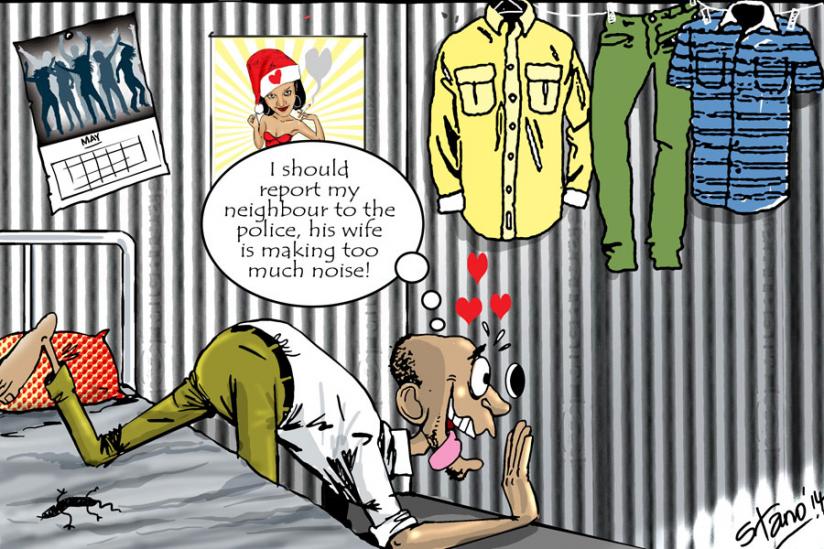No, we need some peace and quiet JUST a week back, a friend of mine posted a very long message complaining about the ongoing noise pollution operations. She questioned how the places she hangs at affect residential areas and also went ahead to say that if there isn't anyone in the area then there's no one to make noise for.


No, we need some peace and quiet
JUST a week back, a friend of mine posted a very long message complaining about the ongoing noise pollution operations. She questioned how the places she hangs at affect residential areas and also went ahead to say that if there isn’t anyone in the area then there’s no one to make noise for.
I reminded her about a church she stayed close to in Kacyiru that she always complained about. Some people, like my friend, want to protect their own interests but still complain about noise from another source, like they want the police to curb noise from churches but let noise from bars go on.
According to Rwanda Environment Management Authority, noise pollution in the country is determined when sound goes beyond 80 decibel (db). Bell is the unit through which noise is measured. 80 db is the level at which sound is physically painful.
I stay very close to my church Rwanda for Jesus and walk there every Sunday. Usually the start of the service is Praise and Worship which is the highest sound that could come from a church.
Outside my gate, I can’t hear a sound and when I get close to the church I hear music - not noise. It is toned to a level that people in church enjoy and someone outside isn’t affected.
Exposure to high level noise causes a number of physiological and psychological responses that include reduced immune response, raised blood pressure, annoyance and speech interference, interference with concentration and thought processes, fatigue and aggression and heart disease, among others.
Rwanda has set the pace via discipline. Other countries learn from us and we are not about to go back on that. Whatever causes distortion will not be tolerated.
We should take this in the perspective of the broken windows theory which is a criminological theory of the norm-setting and signaling effect of urban disorder and vandalism on additional crime and anti-social behavior. The theory states that maintaining and monitoring urban environments in a well-ordered condition may stop further vandalism and escalation into more serious crime. By keeping maximum order, we create an environment we want to live in as well as our children and grand children.
In conclusion, noise pollution becomes an issue only if the police and other authorities are targeting particular institutions and leaving others.
patrick.buchana@newtimes.co.rw
We have bigger issues to solve than noise!
When Police announced strict enforcement of noise pollution regulations, most people started to question the yardstick that will be used to determine high levels of noise pollution. Rwanda Environmental Management Authority says that noise pollution is when sound is above 80 decibels; that is fine but do we have the technology to measure and determine how loud a place is? No!
This reminds me of other issues like determining a person who is over speeding and who is not. They have no technology to measure over speeding limits, so basically we have a scenario where police relies on people for information regarding noise pollution and eye sight to determine over speeding cars.
I don’t doubt their capability to carry out their duties but we surely need to think beyond hearsay and eye sight observation to solve situations. If people are complaining, are they aware about the high level of volume that is allowed? Or they simply complain? As long as they are uncomfortable, it is a matter of reporting a case and before you know it, music equipment and the owner are thrown onto a pickup and taken to the station.
And the men of God have not been spared either. Some days back some of them were also carried to the station. I can only imagine the conversation between the two groups while at the station. So, now that there’s nothing we can use to measure noise pollution, how do we come to the conclusion that places are too noisy?
People will complain for various reasons. Maybe a church is situated in a neighborhood that has non-Christians; maybe some people are not party goers and get irritated when other people are having fun. Look at KGL or Carwash, how many residential houses are there? I guess the mosquitoes complained.
There are various reasons that can be fronted but I’m only looking at the consequences. We are hurting businesses and ultimately people’s source of income. People want to listen to music and dance but not at the level that even a baby would laugh at.
People usually go out because they want to listen to music played at a level they can’t play at home. But ultimately, people will stop going to bars and waitresses, chefs and security personnel will be fired and rendered jobless. So, are we about to see a rise in crime levels?
Besides, I think we should be looking at bigger issues such as water and air pollution before wasting time on noise pollution. Maybe EWSA should be arrested for poor sewage management, and drivers too for polluting the air.
We are striving to make Kigali a tourist destination but how will they be lured with such a dull lifestyle? As churches argue that what they do is organised noise, what about our dear Muslims who start calling on people to wake up for prayers at 4am? Well, next time you enter a bar and find people dancing to no music, don’t think they are mad. That’s where we are headed.


